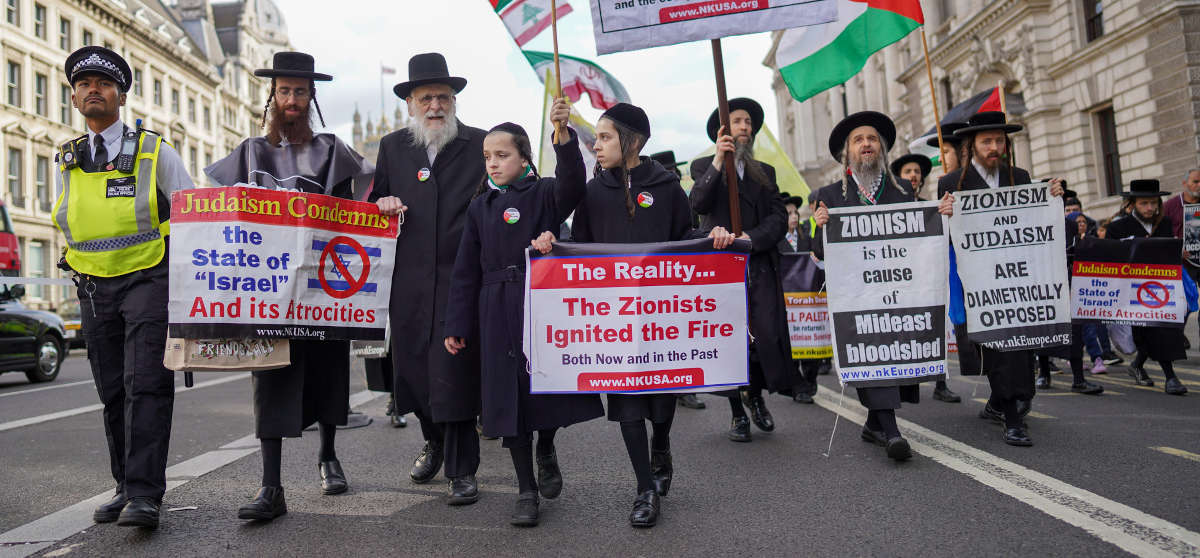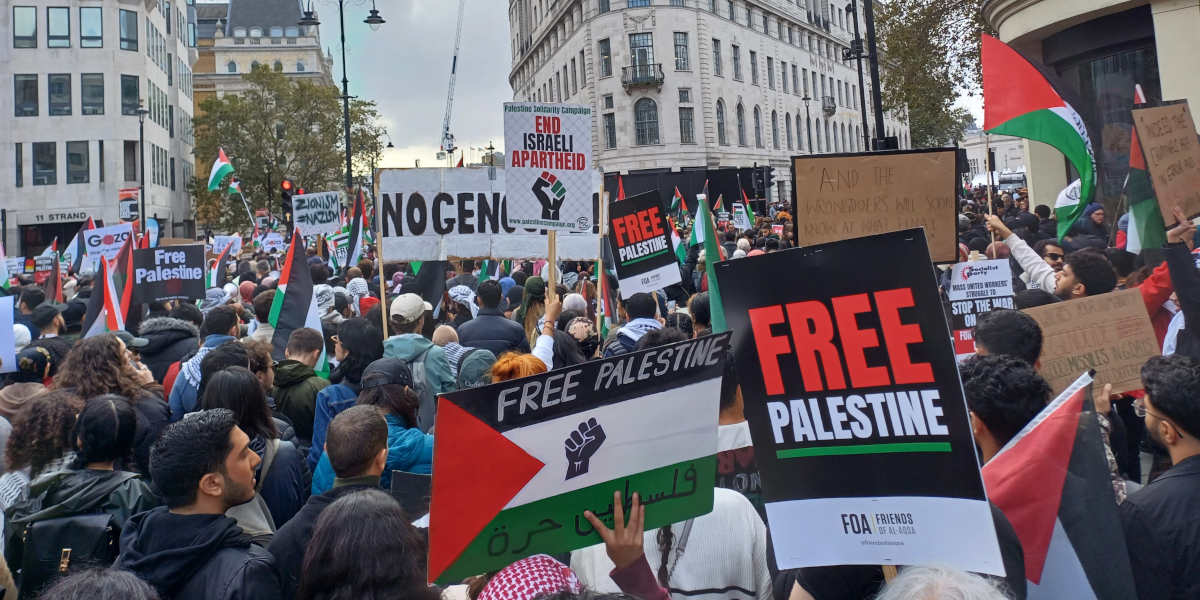The US Congress on 5 December passed what may be its most anti-Semitic ever resolution – in the name of combating hatred against Jews. Two months into a war on Gaza that the UN calls ‘a genocide in the making’, Resolution 894, which was approved by a 311-14 majority, ’clearly and firmly states that anti-Zionism is antisemitism’.
It may have signal rather than legal force but the resolution’s overwhelming approval sends a chilling message ahead of the proposed creation of a new Congressional body on antisemitism with powers to compel Americans to testify and give evidence.
‘Falsely stating that anti-Zionism is antisemitism conflates all Jews with the Israeli state and endangers our communities,’ tweeted Jewish Voice for Peace.
This conflation has long been the sine qua non for antisemites who seek to blame all Jews for the actions of a state that only a minority of them – Israeli Jews – can vote for. That’s why meaningful definitions of antisemitism, such as the Jerusalem Declaration, censure ‘holding Jews collectively responsible for Israel’s conduct’ and avoid what it calls ‘undue emphasis’ on Israel.
In contrast, vague and woolly analogues such as the 2006 European Union Monitoring Centre’s (EUMC) working definition of antisemitism – which formed the basis of the controversial International Holocaust Remembrance Alliance (IHRA) version – muddy the waters to the benefit of pro-Israel advocates.
A US state department adaptation of the EUMC draft in 2010 lists as examples of antisemitism: ‘Blaming Israel for all inter-religious or political tensions, applying double standards by requiring of it a behaviour not expected or demanded of any other democratic nation, [and] multilateral organizations focusing on Israel only for peace or human rights investigations.’
None of these examples necessarily involves discrimination, prejudice, hostility or violence against Jews for being Jewish. Any of them could chill legitimate debate.
The false equivalence between Jews and Zionists
But the Congressional resolution goes further. By explicitly drawing an equivalence between Jews and Zionists, it effectively makes support for ethnic cleansing, apartheid, land seizures and collective punishment into protected Jewish characteristics. They are not.
Anti-Zionism is still a tenet of faith for many ultra-orthodox Jews, who view the creation of the state as heretical before the Messiah’s return. In fact, the Agudath Israel World Organisation which had official pre-war recognition in the parliaments of Poland, Lithuania and Romania, actually petitioned the UN against recognising Israel in 1947.
Moreover, the largest secular Jewish party in swathes of pre-war eastern Europe was the Bund, a socialist and fiercely anti-Zionist party. On the eve of the Holocaust in 1938, it won 17 out of the 20 Warsaw city council seats taken by Jewish parties.
Most of these Jews – including members of my family – died in the Nazi genocide. Were they antisemites? Would this Congress not have made a distinction between them and the fascists who murdered them? Apparently not.
To please Tel Aviv and its backers in Washington, the 5 December Congress resolution spits on their memory and goes after their spiritual descendants, the thousands of anti-racist Jews who blockaded New York’s Grand Central station and the Manhattan bridge in solidarity with Palestinians in Gaza.
The threat to all Palestinians and their supporters
As well as Jews – and by design – the Congressional resolution takes aim at the free speech of all Palestinians, and their supporters. While it references the events of 7 October, the roots of the Israel-palestine conflict go back further.
Israel’s creation on its current territory in 1948 was made possible by the expulsion of around 750,000 Palestinians. Their homes and land were seized by the Israeli state. Palestinian refugees were not allowed to return, but any Jew could migrate to Israel and claim citizenship. Political Zionism was the ideology that strategised, enabled and defended this.
Palestinians cannot support it without denying their own right to their own ancestral land. For this, the Congressional resolution brands them Jew haters.
It turns reality on its head to label opposition to ethnic cleansing and apartheid as racism
Husam Marajda from the US Palestinian Community Network decried it as a bid to ‘cancel’ pro-Palestinian advocates by labelling their discourse as hate speech. ‘It’s super dangerous,’ he told Al-Jazeera. ‘It sets a really, really bad precedent. It’s aiming to criminalise our liberation struggle and our call for justice and peace and equality.’
This situation is precisely what supporters of the IHRA definition of antisemitism assured everyone would not happen when they pushed for its adoption. The IHRA’s examples suggested that ‘denying the Jewish people their right to self-determination’ might be antisemitic, but only depending on the context.
The ‘new antisemitism’ and the escalation of the suppression of free speech
In reality, the definition was underwritten by the ‘new antisemitism’ theory which posits Israel as the ‘Jew of the nations’. It is already driving a major suppression of free speech. A recent survey found that 82 per cent of almost a thousand US academics surveyed censor themselves when they talk about the Israel-Palestine issue. Eleven percent said they restrained themselves from criticising Palestinians – and 81 per cent held back from criticising Israel.
This figure is set to rise significantly. Anyone commenting on Israel-Palestine will soon have to consider how their words may be construed under the bipartisan Commission to study acts of antisemitism in the US Act. This proposes the creation of a new Congressional body with broad subpoena authority to force Americans to testify and give evidence.
The veteran peace activist Richard Silverstein called it ’a dangerous McCarthyite attempt to suppress legitimate criticism of Israel,’ and compared it to the infamous House of Un-American Activities (HUAC).

Anti-Zionism is still a tenet of faith for many ultra-orthodox Jews, who view the creation of the state as heretical
CREDIT: Alisdare Hickson
A storm of islamophopic and anti-Palestinian racism
Certainly, the 7 October attack unleashed a storm of racism which needs to be addressed. The conflict has been linked to the murder of a six-year-old Palestinian boy in Illinois, the shootings of three Palestinian students in Vermont and, potentially, to the death of a 69-year-old Jewish pro-Israel protestor after being hit with a megaphone when two opposing Gaza rallies faced off in Los Angeles.
However, the proposed Commission only deals with antisemitism, not Islamophobia or anti-Palestinian racism. One of its sponsors, the Florida Democrat Debbie Wasserman-Schulz, falsely claimed that the slogan ‘From the river to the sea, Palestine will be free’ meant ‘eradicating Israel and Jews. Period.’ Another sponsor, the Ohio Republican Max Miller sparked outrage when he said: ‘We’re going to turn [Palestine] into a parking lot.’
What sort of anti-racism is that?
The tragic bad maths of the stripped-down equation that ‘anti-Zionism = antisemitism’ answers no questions posed by oppressed people. It is just applauded by pro-Israel lobbies in the US such as AIPAC and the Anti-Defamation League. The equation is banner-headlined in Israel by the Jerusalem Post, in the US by the Wall St Journal and, here, by the Spectator and Daily Telegraph. It turns reality on its head to label opposition to ethnic cleansing and apartheid as racism.
Israel losing the PR war
In truth it is a cynical response to the fact that for all its lobby firepower, establishment support, media buy-in and ability to intimidate, Israel is losing the PR war. It is doing so because the slaughter of thousands of innocent women and children evokes popular disgust.
The new antisemitic genuflection to conflating Jews with Zionists in pro-Israel lobbying will not change that. But we can at least hope that it will point some people back to the original conflation at the heart of the Israel-Palestine conundrum, which makes any solution to the conflict so intractable: the notion of ‘the Jewish State’ itself.
A censorship roll call
It would take a book to list all the groups and individuals censored for defending Palestinians since 7 October. But prominent individuals include Nurit Peled-Elhanin, Meir Baruchin, Michael Eisen, Nathan Thrall, Viet Thanh Nguyen, Adania Shibli, Mehdi Hasan, Susan Sarandon, Avi Shlaim, Andy McDonald MP, Paul Bristow MP, David Velasco, Yuval Carasso, Ryna Workman, Maha Dakhil and Melissa Barrera,
Targeted groups in the US include Workers United (the Starbucks union), the US Campaign for Palestinian Rights and Students for Justice in Palestine. Billionaires have even called for the blacklisting of Harvard students who signed a petition blaming Israel’s occupation for the 7 October attacks.
In Israel, the situation is worse, with attacks, detentions and harassment common. Jewish peace activists describe facing ‘violent fascist persecution that increasingly resembles the junta regimes of the 1970s in Latin America’.
Over 100 Palestinian students have reported repression based on social media posts. Dozens of academic disciplinary cases launched. One Jewish journalist, Israel Frey, went into hiding after a mob surrounded his house, aiming fireworks at his windows. His offence was saying kaddish, the Jewish prayer for the dead, for civilians in Gaza.
The director of Petah Tikva hospital’s cardiac intensive care unit was suspended for an online profile picture of a dove carrying an olive twig and a green flag with the shahada declaration of faith. Peace activists have even been arrested for putting up posters saying ’Jews and Arabs, we will get through this together’.
Reliable sources of uncensored information, analysis and opinion
In the context of suppression of voices supporting Palestine or criticism of Israel here are reliable, uncensored sources of news and analysis










